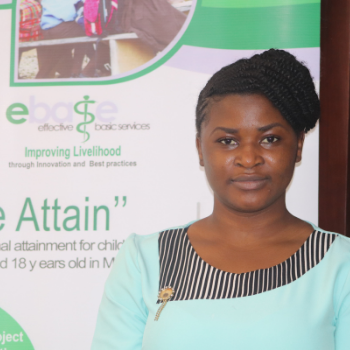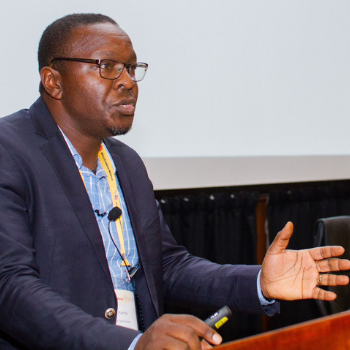AN UNDERSERVED POPULATION CONNECTED TO BASIC SERVICES
Dr Patrick Mbah Okwen is the team lead at Effective Basic Services (eBASE) Africa and District medical officer for the Bali District Health Service. He is a medical doctor practicing in primary care in Cameroon. Patrick is passionate about getting research into policy, practice, and households in basic services through use of innovative approaches.
By Patrick Mbah Okwen and Nain Mirabel Yuh
Development of the eBASE Family-Centred Evidence Toolkit for Disability
There is a global burden of disability at 15% , and a local burden of 10.5% in the North West Region of Cameroon. Getting research evidence into policy, practice, and in the lives of people living with disability (PWD) remains a challenge. As a result, eBASE Africa organised stakeholder sessions with families of children living with disabilities (CWD), did a qualitative study with families of CWD to gather experiences of CWD around their families and communities with access basic services. One of the barriers to accessing basic services was challenges in getting disability cards.
There is no evidence showing that this kind of project has been implemented before in our project areas. eBASE Africa searched for evidence in the evidence databases, synthesised this evidence and modelled recommendations to match current practices in the families and communities of CWD in Bamenda. Through this, they developed a toolkit: The Family Centred Evidence Toolkit for Disability (EFCETD). The toolkit targets children and young adults with disabilities, their families and communities and uses voice, preferences, and perspectives of families with CWD to assess their rights and needs. This toolkit is designed to be used by community health care workers (CHWs), to audit household practices and score families on their compliance with evidence-based practices for CWD. The toolkit is in the form of a scorecard embedded into the smart phones of CHWs. The toolkit is embedded in smartphones using an app called Magpi. This has been generously made available to us by Data Dyne (now Magpi) in USA (www.magpi.com). With results from these scorecards, evidence-based recommendations are made.
The disability scorecard in practice
The use of the scorecard required several practical and financial investments as below:
• Training the CHWs on the use of the scorecard during household visits. The training of CHWs helped them to use smartphone technology and geolocalisation for easy identification and follow up of the CWD and their families. It also facilitated the integration of this project into their work. Although the cost for training may be high, the modules have already been developed this helps to subsidise or reduce cost for subsequent trainings. The returns on investments will be even higher if the project is up scaled.
• Seed funding to qualifying households assessed by the scorecard: Families who meet cut-off score of up to 60% compliance with evidence-based recommendations are rewarded with a seed fund to support the needs of their CWD through income generating activities. So far, thirty families have benefitted from the seed fund , for income generating activity to support the needs of their CWD. Although the amount awarded was quite small to support families to meet the needs of their CWD, these families have also committed to engaging their CWD in evidence practices improving their rights and meeting their needs.
• Adaptations to security threats: Due to insecurity in the North and Southwest Cameroon, CHWs resorted to going out for home visits in teams rather than as individuals. The complexity of the COVID-19 pandemic meant that the project needed to also provide safety equipment to the CHWs, CWD and their families. The safety equipment included gloves, hand sanitizers and masks for both CHWs and CWDs plus their families.
• Advocacy on behalf of CWD households: eBASE Africa shared research evidence with policy makers to demonstrate the impact of this intervention on empowering CWD households. The policy makers included regional chief of PWD and the district Medical officer for Bamenda health district. As a result, policy makers relaxed the procedure for acquiring a disability card for CWD. This was in terms of rather than making the families to move from one office to the other, all business was conducted in one office. There has also been the integration of the Family Centred Evidence Toolkit in the health system, and the CHWs have been able to explore disability components during their regular household visits.
Challenges and lessons learned
eBASE Africa underestimated the workload that would be involved in the project, hence overrunning the allocated time, i.e., 2 years instead of the planned 18 months. There was limited funding, as what was available was pegged on the originally set project period. Poor internet was another major challenge. Lastly, despite having developed comprehensive guidelines and policies for community rehabilitation based on the UN Convention on the Rights of Persons with Disabilities in Cameroon and Niger, implementation is still elusive.
In a nutshell…
Research periods can be unpredictable and therefore adequate planning needs to be incorporated. Adequate funding is also critical for sustainability of projects. eBASE Africa intends to further develop this toolkit, get more funding, engage more stakeholders, test the toolkit using more rigorous scientific approaches like randomised control trial and extend the work to the other regions of Cameroon extend to Niger, Nigeria, and Chad.

